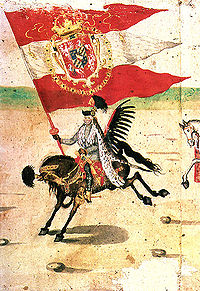- Chorąży
-
Chorąży or Khorunzhyi (Polish pronunciation: [xɔˈrɔ̃ʐɨ]; means "Standard-bearer"; Russian and Ukrainian: Хорунжий, transliterated: Khorunzhiy) is a military rank in Poland, Ukraine and some neighboring countries. A chorąży was once a knight who bore a standard — the emblem of an armed troop, a province (województwo), a land (ziemia), a duchy, or the kingdom. This function later evolved into a non-hereditary noble title.
From the end of the 14th century in the Kingdom of Poland and the Grand Duchy of Lithuania, and later in the Polish-Lithuanian Commonwealth, there were four "central" Chorąży positions:
- Grand Standard-Bearer of the Crown;
- Grand Standard-Bearer of Lithuania;
- Court Standard-Bearer of the Crown;
- Court Standard-Bearer of Lithuania.
At the same time, Chorąży was also an honorary office in a land.
From the 16th century, Chorąży was the title of the military leader of a Cossack community, and later a rank in the Cossack Hosts. The rank, written "хорунжий" (Khorunzhiy) in Russian, was officially recognized in the 1792 Table of Ranks. This Cossack junior officer rank corresponded to the rank of second lieutenant (подпоручик, or podporuchik) of infantry or cornet of cavalry.
In the Republic of Poland in 1919-1922 and from 1963 in the People's Republic of Poland (from 1989, in contemporary Poland), it has been an officer's rank, above sergeant and below second lieutenant. Warrant Officer OR-7, OR-8, OR-9. Between 1944 and 1957, it was the lowest officer's rank.
History of ``Warrant Officers`` Corps
Corps warrant officers is the name of the personal body of soldiers in the Polish Army, which existed between 1963-2004, higher than the NCO corps, and lower than the officer. The body was introduced in 1963, expanded in terms of the hierarchy in 1967 and 1996 and again in July 2004 it was abolished as a separate body, while the ranks of soldiers wearing standard-bearers included senior NCOs. At the time of the introduction of this corps, professional soldiers who are its members should hold a secondary education matriculation. Virtually warrant were highly skilled technicians.
Decision of the politicians who are motivated by their conduct a lack of warrant officers in the armies of both NATO and others, warrant officers corps was liquidated, playing him in the NCO corps. Result was a marked change in the ratio between officers and NCOs standard-bearers. This decision is criticized, among others for the fact that according to some stakeholders the possibility of multiple standard-bearer was closed and education skills, because that decision is thought to be the officers responsible for planning and decision-making process, and non-commissioned officers for carrying out orders.
See also
- Ensign (military rank)
- Offices in Polish-Lithuanian Commonwealth
- Khorugv
Categories:- Military ranks of Poland
- Lithuanian titles
- Military organization of Cossacks
- Military ranks of Russia
- Military ranks of Ukraine
- Polish history stubs
- Military rank stubs
- Polish military stubs
- Lithuanian history stubs
- Russian history stubs
- Ukrainian history stubs
Wikimedia Foundation. 2010.






